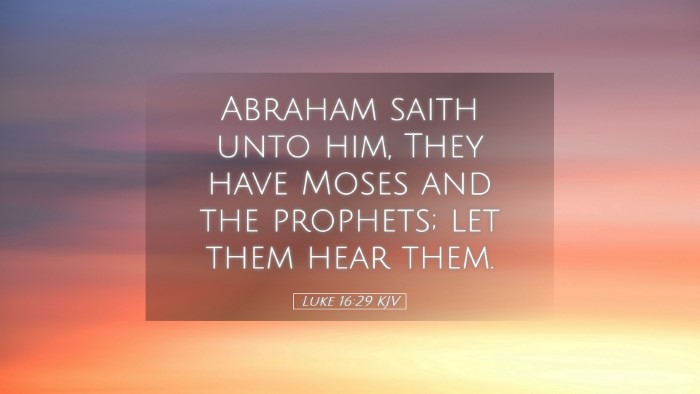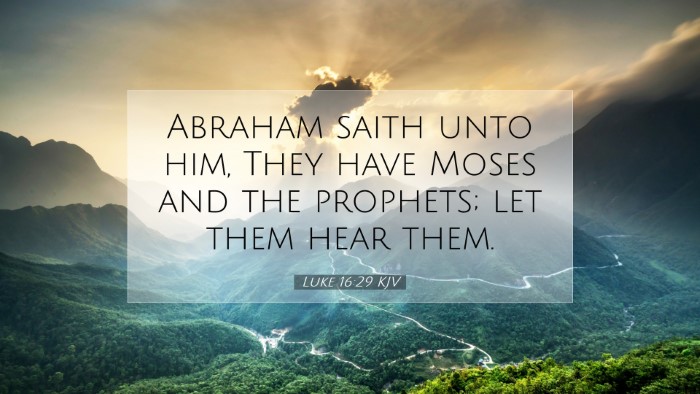Commentary on Luke 16:29
Bible Verse: "Abraham said unto him, They have Moses and the prophets; let them hear them."
Introduction
This verse occurs within the context of one of Jesus' parables, the story of the rich man and Lazarus, which illustrates the realities of the afterlife and the importance of heeding God's word. In Luke 16:29, Abraham responds to the rich man's plea for his family to be warned about their fate, emphasizing the sufficiency of Scripture.
Exegesis and Theological Implications
Understanding the Context
This parable serves as a poignant reminder of the consequences of a life lived in indifference to God. The rich man, now in torment, desires for Lazarus to be sent to warn his brothers so that they might escape his fate. Abraham's answer points to the established revelation of God, contained in the writings of Moses and the prophets.
The Sufficiency of Scripture
Matthew Henry emphasizes that the Scriptures are sufficient for human instruction and are divinely inspired to guide humanity in righteousness. Abraham's assertion that "they have Moses and the prophets" indicates that the truth provided through these writings is adequate to impart wisdom for salvation and to avert spiritual disaster.
Obedience to God’s Word
Albert Barnes highlights the importance of hearing and obeying God's Word as the means through which individuals obtain knowledge of God’s will. The rich man's request reveals a misunderstanding; he believed additional revelation was necessary. However, this notion underestimates the authority and potency of the existing Scriptures.
The Role of Prophets
Adam Clarke notes the role of prophets as messengers who conveyed God’s warnings and teachings about repentance. Their messages were designed to lead people toward righteousness, illustrating God’s ongoing dialogue with humanity throughout history.
The Warning Against Complacency
This passage serves as a dire warning against complacency. The rich man’s brothers were probably living in the same lavish manner as he once did and were thus unaware of their spiritual downfall. Clarke also remarks on the danger of ignoring the warnings present in the Scriptures, as they contain the very truths that can save a soul from eternal condemnation.
Biblical and Practical Applications
Worldly Attitudes vs. Spiritual Awareness
The rich man epitomizes a worldly mentality that prioritizes earthly pleasures over spiritual realities. Henry suggests that this passage invites readers to reflect on their own lives, urging them to consider their prioritization of spiritual matters over temporal concerns.
Faithfulness in Evangelism
Christian leaders and evangelists are reminded of the responsibility to faithfully proclaim the truth found in Scripture. Barnes notes that rather than seeking miraculous signs or special revelations, believers should dedicate their efforts to studying and teaching the Word of God as they embody its transformative power.
Encouragement to Seek God
This verse encourages believers to seek out the wisdom and guidance embedded in both the Old Testament and New Testament Scriptures. The timeless nature of these texts allows individuals to grow in faith and understanding, providing a foundation upon which to build a thriving spiritual life.
Conclusion
Ultimately, Luke 16:29 serves as a significant reminder of the necessity of Scripture in the life of faith. The words of Moses and the prophets remain as relevant today as they were in ancient times, possessing the power to lead individuals toward eternal life. As pastors, theologians, and students of the Word, we must remain steadfast in our commitment to Scripture, allowing it to guide our lives and ministries.
Reflection Questions
- How do you prioritize the study of Scripture in your personal life and ministry?
- What specific messages from the Bible resonate with you regarding God's expectations for living righteously?
- In what ways can we encourage others to heed the warnings and teachings found in the Scriptures?


